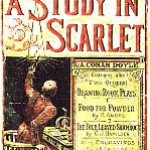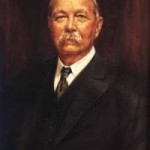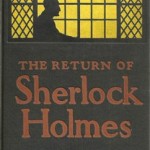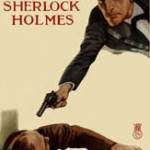“Oh, an Irish-American?”
“If you heard him talk you would not doubt it. Sometimes I assure you I can hardly understand him. He seems to have declared war on the King’s English as well as on the English king. Must you really go? He may be here any moment.”
“No. I’m sorry, but I have already overstayed my time. We shall expect you early to-morrow, and when you get that signal book through the little door on the Duke of York’s steps you can put a triumphant Finis to your record in England. What! Tokay!” He indicated a heavily sealed dust-covered bottle which stood with two high glasses upon a salver.
“May I offer you a glass before your journey?”
“No, thanks. But it looks like revelry.”
“Altamont has a nice taste in wines, and he took a fancy to my Tokay. He is a touchy fellow and needs humouring in small things. I have to study him, I assure you.” They had strolled out on to the terrace again, and along it to the further end where at a touch from the Baron’s chauffeur the great car shivered and chuckled. “Those are the lights of Harwich, I suppose,” said the secretary, pulling on his dust coat. “How still and peaceful it all seems. There may be other lights within the week, and the English coast a less tranquil place! The heavens, too, may not be quite so peaceful if all that the good Zepplin promises us comes true. By the way, who is that?”
Only one window showed a light behind them; in it there stood a lamp, and beside it, seated at a table, was a dear old ruddy-faced woman in a country cap. She was bending over her knitting and stopping occasionally to stroke a large black cat upon a stool beside her.
“That is Martha, the only servant I have left.”
The secretary chuckled.
“She might almost personify Britannia,” said he, “with her complete self-absorption and general air of comfortable somnolence. Well, au revoir, Von Bork!” With a final wave of his hand he sprang into the car, and a moment later the two golden cones from the headlights shot through the darkness. The secretary lay back in the cushions of the luxurious limousine, with his thoughts so full of the impending European tragedy that he hardly observed that as his car swung round the village street it nearly passed over a little Ford coming in the opposite direction.
Von Bork walked slowly back to the study when the last gleams of the motor lamps had faded into the distance. As he passed he observed that his old housekeeper had put out her lamp and retired. It was a new experience to him, the silence and darkness of his widespread house, for his family and household had been a large one. It was a relief to him, however, to think that they were all in safety and that, but for that one old woman who had lingered in the kitchen, he had the whole place to himself. There was a good deal of tidying up to do inside his study and he set himself to do it until his keen, handsome face was flushed with the heat of the burning papers. A leather valise stood beside his table, and into this he began to pack very neatly and systematically the precious contents of his safe. He had hardly got started with the work, however, when his quick ears caught the sounds of a distant car. Instantly he gave an exclamation of satisfaction, strapped up the valise, shut the safe, locked it, and hurried out on to the terrace. He was just in time to see the lights of a small car come to a halt at the gate. A passenger sprang out of it and advanced swiftly towards him, while the chauffeur, a heavily built, elderly man with a gray moustache, settled down like one who resigns himself to a long vigil.
“Well?” asked Von Bork eagerly, running forward to meet his visitor.
For answer the man waved a small brown-paper parcel triumphantly above his head.





